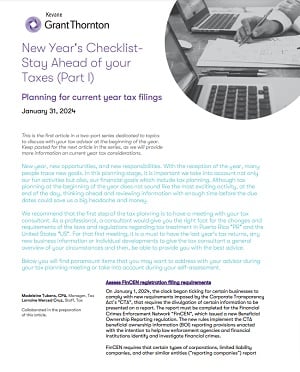-
Financial statements audits
Financial statement audits
-
Compliance audits
Compliance audits
-
Compilations and reviews
Compilations and audit
-
Agreed-upon procedures
Agreed-upon procedures
-
Corporate and business tax
Our trusted teams can prepare corporate tax files and ruling requests, support you with deferrals, accounting procedures and legitimate tax benefits.
-
International tax
Our teams have in-depth knowledge of the relationship between domestic and international tax laws.
-
Tax compliance
Business Tax
-
Global mobility services
Through our global organisation of member firms, we support both companies and individuals, providing insightful solutions to minimise the tax burden for both parties.
-
Sales and use tax and indirect taxes
SUT/ VAT & indirect taxes
-
Tax incentives program
Tax incentives program
-
Transfer Pricing Study
The laws surrounding transfer pricing are becoming ever more complex, as tax affairs of multinational companies are facing scrutiny from media, regulators and the public

-
Business consulting
Our business consulting services can help you improve your operational performance and productivity, adding value throughout your growth life cycle.
-
Risk advisory services
We can help you identify, understand and manage potential risks to safeguard your business and comply with regulatory requirements.
-
Technology Advisory
We provide comprehensive solutions to safeguard your business and ensure operational resilience and compliance. Our expert team offers a range of technology advisory services designed to address your cybersecurity needs, enhance business continuity, and manage security effectively.
-
Transactional advisory services
Transactions are significant events in the life of a business – a successful deal that can have a lasting impact on the future shape of the organizations involved. Because the stakes are high for both buyers and sellers, experience, determination and pragmatism are required to bring deals safely through to conclusion.
-
Forensic and investigative services
At Grant Thornton, we have a wealth of knowledge in forensic services and can support you with issues such as dispute resolution, fraud and insurance claims.


This is the first article in a two-part series dedicated to topics to discuss with your tax advisor at the beginning of the year. Keep posted for the next article in the series, as we will provide more information on current year tax considerations.
New year, new opportunities, and new responsibilities. With the reception of the year, many people trace new goals. In this planning stage, it is important we take into account not only our fun activities but also, our financial goals which include tax planning. Although tax planning at the beginning of the year does not sound like the most exciting activity, at the end of the day, thinking ahead and reviewing information with enough time before the due dates could save us a big headache and money.
We recommend that the first step of the tax planning is to have a meeting with your tax consultant. As a professional, a consultant would give you the right foot for the changes and requirements of the laws and regulations regarding tax treatment in Puerto Rico "PR" and the United States "US". For that first meeting, it is a must to have the last year's tax returns, any new business information or individual developments to give the tax consultant a general overview of your circumstances and then, be able to provide you with the best advice.
Below you will find paramount items that you may want to address with your advisor during your tax planning meeting or take into account during your self-assessment.
Assess FinCen registration filing requirements
On January 1, 2024, the clock began ticking for certain businesses to comply with new requirements imposed by the Corporate Transparency Act’s "CTA", that requires the divulgation of certain information to be presented on a report. The report must be completed for the Financial Crimes Enforcement Network "FinCEN", which issued a new Beneficial Ownership Reporting regulation. The new rules implement the CTA beneficial ownership information (BOI) reporting provisions enacted with the intention to help law enforcement agencies and financial institutions identify and investigate financial crimes.
FinCEN requires that certain types of corporations, limited liability companies, and other similar entities (“reporting companies”) report their beneficial owners. Beneficial owners are individuals who have 25% or more ownership of the entity or exercise “substantial control” over the entity. Based on the criteria defined in the regulation for "substantial control", a beneficial owner includes shareholders, officers, directors, or other individuals who have a significant interest in the company.
Reporting companies include entities organized or registered in Puerto Rico if certain requirements are met. However, note that the legislation exempted more than 30 types of entities from reporting, mostly those who are already heavily regulated by federal and/or state governments.
The legislation requires reporting companies to provide FinCEN with the following information about each beneficial owner:
● Name;
● Date of birth;
● Address;
● Unique identification number and the issuing jurisdiction; and
● Image of the document from which the unique identifying number was obtained.
The reporting company will need to provide the following information:
● Legal name and any trade names;
● Current address and its principal place of business, if a US company, if foreign its principal place of business in the US;
● Jurisdiction of formation or registration; and
● Taxpayer Identification Number.
Moreover, to complete the report, there are due dates to comply with that are based on the time of creation or registration of the entity and the reason the report is being made. For instance, those companies created or registered before January 1, 2024 will have one year (until January 1, 2025) to file their initial reports, while companies created or registered after January 1, 2024 will have 90 days after creation or registration to file their initial reports. For those created after January 1, 2025, the report must be filed within 30 days of the effectiveness of the creation.
In addition, the regulation requires reporting companies to keep information up-to-date and report any changes which will include additional due dates to review. All the reports must be made electronically through the filing system that is available via the FinCEN’s website. Companies non-compliant with the report may be exposed to penalties of $500 per day and/or $10,000 per year in addition to criminal exposure.
There are complexities involved while ensuring compliance with the reporting requirements, as such, we encourage companies to seek legal or other professional guidance to ensure proper adherence to these regulations. Since there are still uncertainties surrounding this issue, it is important to consult with your tax advisor to determine whether the preparation of the report is within the scope of their tax services.
Analyze if the entity needs to prepare Audited Financial Statements or AUP to support deductions
The PR Code has indications for every business engaged in a trade or business in the production of income of PR which may or may not be required to submit audited financial statements with its income tax return. To review the requirements, the taxpayer needs to assess, at the beginning of the year, the volume that the business generated for the taxable year. Based on the volume of business, the business may be required to present additional reports as part of its filing requirements. All the reports must be prepared by a Certified Public Accountant "CPA". The taxpayer should assess with their consultant if they meet the criteria to submit supporting documentation with their Puerto Rico tax return, such as audited financial statements and agreed upon procedures report.
For additional details, refer to the following article:
Puerto Rico Income Tax Deductions for Corporations: A Step-by-Step Guide | Grant Thornton
Assess the need to update the transfer pricing report before filing
Taxpayers who made certain intercompany transactions must comply with the transfer pricing requirements stated in section 482 of the United States Internal Revenue Code "US Code", as provided by the Puerto Rico Internal Revenue Code "PR Code" to support related deductions. To certify compliance with these requirements to the PR Treasury Department, the taxpayer needs to attach Form SC 6175 to their Puerto Rico income tax return.
For transfer pricing reports, the US Code’s regulation requires documentation that accurately and completely represents the intercompany transactions that took place. In line with this, the methods used, the business overview, the structure, and other documentation must be current as of the filing date of the return and align with the current status of the business and applicable rules and regulations. While transfer pricing reports do not have a set expiration date, situations like a change in the facts and circumstances of the taxpayer and substantial change of relevant transactions require updated reports to ensure accuracy and avoid potential legal action.
For more information regarding the transfer pricing requirements in PR, go to the following link: Puerto Rico transfer pricing | Grant Thornton insights
Calculate your 2023 tax liability early
Tax provisions are the estimated amount of income tax that a taxpayer is expected to pay to the PR Treasury Department or the US Treasury Department. Based on different factors, it is fundamental that you have all the information needed to compute the tax provisions as early as possible. The earlier it is done, the earlier a business or individual can get the idea of how much will be the tax before the due date and then the income tax returns can be filed on time.
Assess the need to use tax credits
Tax credits are a tool to satisfy or supplement income tax responsibilities. As such, while planning for the year, a taxpayer should review the utilization of any past credits or anticipate credits that are likely to be generated during the year to appraise their tax liability and ascertain the necessary estimated income tax payments. In addition, the taxpayer may opt to purchase tax credits as a tax savings tool.
For a more detailed review of the tax credits available, visit the following link:The Ins and Outs of Puerto Rico Tax Credits as a Tax Savings Tool | Grant Thornton
Discuss Treasury Department Notifications
If you receive a letter from the Treasury Department regarding your income tax return, schedule a review with your accountant. The letter might mention adjustments to your income, deductions, or credits, potentially impacting your final tax obligation.
We have experienced tax professionals available to discuss your checklist and ensure there are no missed opportunities. Contact us at your earliest convenience to coordinate a meeting and help you address these matters.
We are committed to keeping you informed of all the latest developments in laws and regulations that affect businesses in Puerto Rico. We can help you navigate the complex tax landscape to ensure that you are taking advantage of all the available benefits. Contact us today to learn more about how we can help you.
ACKNOWLEDGMENT: This article was prepared in collaboration with Lorraine Merced Cruz, Staff, Tax


